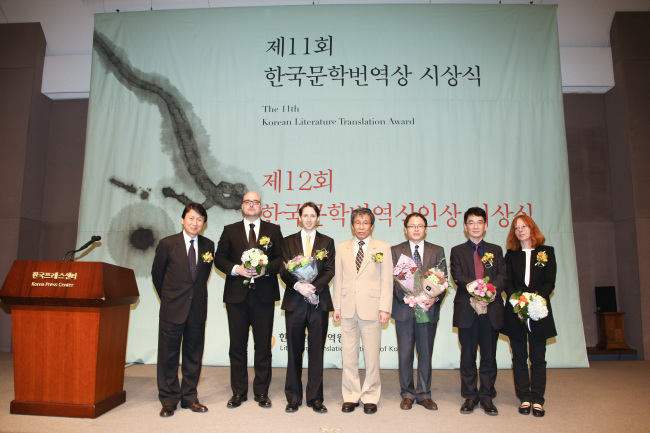 |
|
The winners of the 12th Korean Literature Translation Award pose for a photo at the awards ceremony in central Seoul, Monday. From right: Miriam Lowensteinova, Song Byeong-sun, Kim Hak-cheol, LTI Korea director Kim Seong-kon, Charles La Shure, Marek Zemanek, and Kwon Young-min, the head judge for the award. (LTI Korea) |
Korean-Chinese scholar Kim Hak-cheol (Jin Hezhe) arrived in Seoul in 2001 at age 28 without knowing much about the country.
Now 41, Kim is an associate professor teaching Korean literature at Harbin Institute of Technology in Weihai, China. Kim, who worked as a journalist in China for seven years before studying comparative literature at Seoul National University, is a third-generation Korean-Chinese born in Yanbian, a Korean autonomous prefecture in Jilin Province, China.
On Wednesday, Kim received the top prize at the 12th annual Korean Literature Translation Awards for translating Korean novelist Lee Mun-gu’s “Gwanchonsupil” into Chinese. The award is given by Korea’s state-run Literature Translation Institute of Korea.
“I didn’t know much about Korean literature until I came to Korea in 2001,” Kim said during an interview with The Korea Herald in Seoul, on Wednesday. “I find translating both very challenging and fascinating at the same time.”
Kim’s grandfather left Korea for the Yanbian region of China during the Japanese colonial period. There he met and married Kim’s grandmother, a Korean woman whose family had been living in Russia.
Though Kim, who has published a short story in Chinese, attended Chinese schools and majored in Chinese literature, he spoke Korean at home. It was when he met Korean-Chinese professors while working as a journalist ― he mostly covered politics, social issues and crime ― that he became interested in learning about his ethnic heritage.
“The professors encouraged me to learn more about Korea and its culture,” said Kim. “I thought about what they said and concluded that they had a point. I quit my job and applied for a graduate program at Seoul National University.”
Kim started reading Korean works of literature while attending Seoul National University. He eventually earned his Ph. D. in comparative literature in 2009. “It was refreshing to see Korean students sharing their opinions freely,” Kim said.
Kim’s favorite Korean authors are late novelist Lee Cheong-jun (“This Paradise of Yours” and “Seopyeonje”) and Sung Suk-je (“Possessed,” “The Last 4.5 Seconds of My Life”).
“Lee’s works go beyond the issues of ideology and the social system, and reveal things about human nature,” Kim said. “And I appreciate Sung’s sense of humor. His works are easy to read and also have substance.”
Now teaching Korean literature and Korean-Chinese translation in China, Kim said he stresses the importance of understanding the role of culture within language learning. He said his experience writing fiction in Chinese as well as working as a journalist helps him with his translation work and his understanding of Korean texts.
“Another thing that I stress is to be a good writer in one’s native language (target language),” he said. “I think that is arguably one of the most important things for a translator. You can’t translate the subtle nuances if you are not an adept writer in your native language.”
Four other translators shared the prize on Wednesday. Charles La Shure, who currently teaches at the Hankuk University of Foreign Studies Graduate School of Interpretation and Translation, received an award for translating Kim Young-ha’s novel “Black Flower” into English.
Korean scholar Song Byeong-sun won a prize for translating Yun Heung-gil’s work of fiction “The Man Who Was Left as Nine Pairs of Shoes” into Spanish.
Czech scholars Miriam Lowensteinova and Marek Zemanek shared an award for co-translating the “Samguk Yusa,” a collection of folktales and historical legends from during and after the Three Kingdoms Period of Korea (A.D. 57-668) into Czech.
By Claire Lee (dyc@heraldcorp.com)